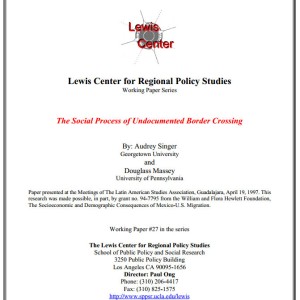
Authors: Audrey Singer, Douglass Massey
Date: December 1, 1997
Project: [wpv-post-link id=”$project”]
In this paper we develop a theoretical model that views undocumented border-crossing as a well-defined social process influenced by the kind of human and social capital migrants bring with them to the border and constrained by the intensity and nature of U.S. enforcement efforts. We draw upon detailed histories of border-crossing from undocumented migrants originating in 34 Mexican communities to estimate equations corresponding to this model. We find that having a migrant parent greatly increases the odds of crossing the border with family or friends, and that people with ties to migrant parents and those who come from communities where U.S. migration is prevalent are more likely to cross with paid smugglers, or coyotes. As people accumulate migratory experience across U.S. trips, however, they grow progressively less likely to travel with others and more likely to cross alone, thus substituting migration-specific human capital for social capital. On initial undocumented trips, crossing with either a paid or unpaid guide (a coyote, friend, or relative) dramatically lowers the odds of arrest; but on subsequent trips the mode of crossing has no effect on the odds of apprehension, which are determined primarily by the migrant’s own characteristics, particularly the knowledge and experience gained on earlier trips. U.S. enforcement efforts have little effect on the likelihood of arrest, except that INS involvement in drug enforcement sharply lowers the odds of apprehension.
Link to Publication